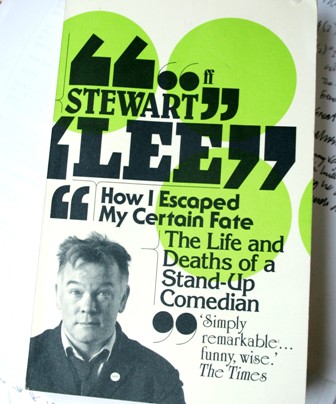
No 22 How I Escaped My Certain Fate: the Life and Deaths of a Stand-up Comedian by Stewart Lee
What’s it about?
“I never wanted to be a comedian,” explains Stewart Lee in the first line of his book before detailing how he became a stand-up and why, after a decade of gigs, high-profile tours and television series, he “gradually, incrementally and without any fanfare” stopped being one. The story continues with Lee, as one commentator on the comedy scene put it, “bouncing back into the public eye by accidentally co-writing Jerry Springer – The Opera” and, through his involvement with the complexities and controversies of opera, ultimately rediscovering the value and importance of stand-up as an art form, as a mode of communication and as a sustainable way to make a living.
What’s it got to do with leisure?
This is a clear-eyed examination of the process of stand-up comedy as one of the purest forms of performance. Lee offers a pointed and sometimes painfully honest account of the creative process and the commercial realities of life as an artist trying to make a living in an increasingly complicated and highly competitive cultural environment. How I Escaped My Certain Fate has relevance for anyone who has ever wondered what it takes to be funny and will give food for thought for anyone who has been obliged to consider how to fill a medium-sized provincial theatre space on a Tuesday night in October.
Why should I read it?
How I Escaped My Certain Fate is an unsentimental master-class in writing and performance, laying bare the process and pressure of daring to declare yourself a comedian. This is a book about one man’s life as a moderately successful comedian but it also lets light in upon the life of an artist and of a life in art. Now acknowledged as one of our foremost stage performers and comedy writers, Lee provides captivatingly articulate insights to his failures and shortcomings, along the way examining the artistic process and the importance of performance art central to our cultural life.
Comprising heavily annotated transcripts of three of Lee’s live shows interspersed with some autobiographical accounts of his career by way of context, How I Escaped My Certain Fate explains why stand-up is one of the purest art forms and why it is so difficult to get right. His self-awareness and honest assessment of his skills, and the skills of others in the field, is both challenging and compelling. “Suddenly everything was clear. It was the twenty-first century and I was a mumbling relic from an earlier age… Arch, cynical, tired, fake, conceited, formulaic and flat.” This is not the sort of thing you will find in a ghost-written autobiography of a television celebrity looking to justify their success; which is why you don’t read them.
At the heart of the narrative (if, given the many compelling footnote diversions, narrative it is) is the story of the value of collaboration, the necessity of support from friend and peers, and Lee’s own dogged determination to work out why he could not make a success of something he had been so good at. But for the Battersea Arts Centre’s Scratch Nights, where performers could use facilities for free to develop new work on the proviso that they showed and discussed work in progress with a public audience, Richard Thomas might never have been able to contemplate a project like Jerry Springer – the Opera and Lee’s drift away from comedy might have continued. But for Ricky Gervais, whose approach to stand-up Lee realised was very close to his own, the drift might have become a sinking. “Now Ricky was a big name, I could understand why the casual viewer would mistake me for an imitator of his approach,” Lee explains. “I hadn’t realised how much my stand-up matter to me until I considered the possibility of never being able to do it again.”
And so he begins again, “like a punch-drunk prizefighter with no other viable skills who thought maybe there still might be a battle to be won. And I realised that stand-up was just one man on a stage in a room. And so stand-up was infinite. And I had been a fool to doubt it.”
the leisure manager’s library
An occasional series offering a guide to leisure-related literature
